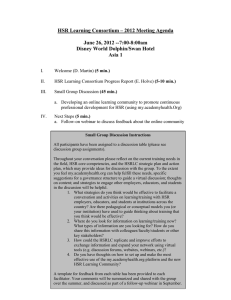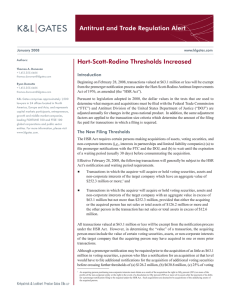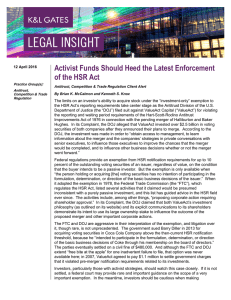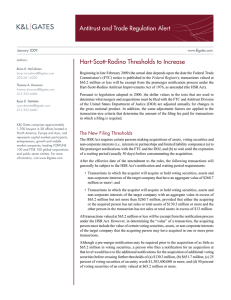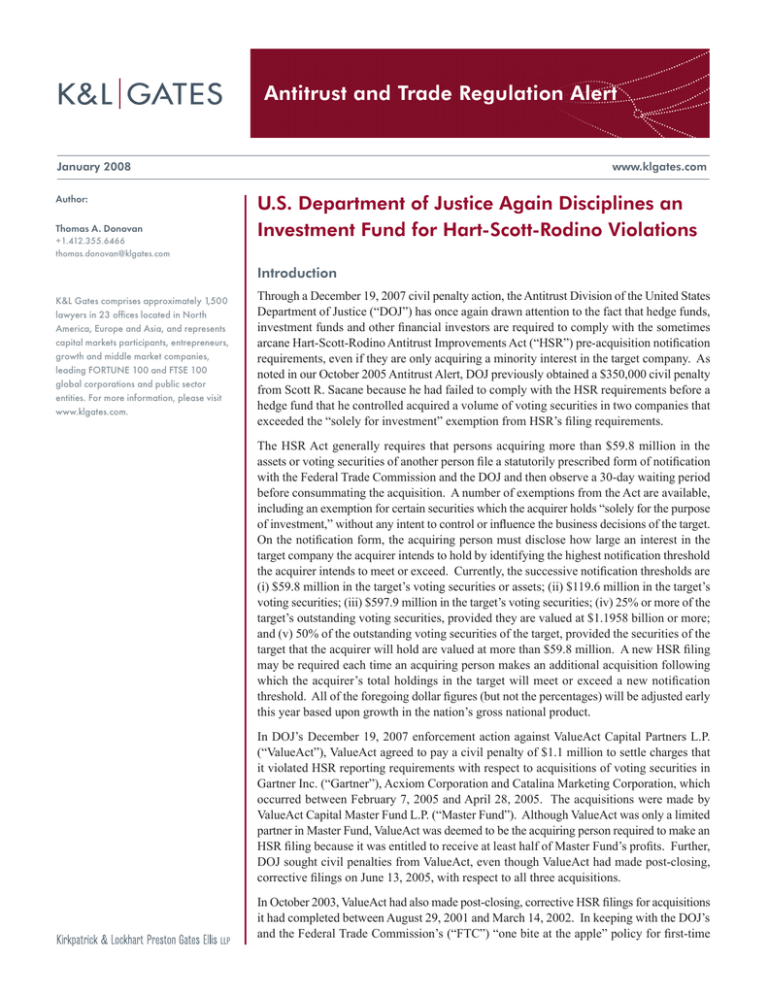
Antitrust and Trade Regulation Alert
January 2008
Author:
Thomas A. Donovan
+1.412.355.6466
thomas.donovan@klgates.com
www.klgates.com
U.S. Department of Justice Again Disciplines an
Investment Fund for Hart-Scott-Rodino Violations
Introduction
K&L Gates comprises approximately 1,500
lawyers in 23 offices located in North
America, Europe and Asia, and represents
capital markets participants, entrepreneurs,
growth and middle market companies,
leading FORTUNE 100 and FTSE 100
global corporations and public sector
entities. For more information, please visit
www.klgates.com.
Through a December 19, 2007 civil penalty action, the Antitrust Division of the United States
Department of Justice (“DOJ”) has once again drawn attention to the fact that hedge funds,
investment funds and other financial investors are required to comply with the sometimes
arcane Hart-Scott-Rodino Antitrust Improvements Act (“HSR”) pre-acquisition notification
requirements, even if they are only acquiring a minority interest in the target company. As
noted in our October 2005 Antitrust Alert, DOJ previously obtained a $350,000 civil penalty
from Scott R. Sacane because he had failed to comply with the HSR requirements before a
hedge fund that he controlled acquired a volume of voting securities in two companies that
exceeded the “solely for investment” exemption from HSR’s filing requirements.
The HSR Act generally requires that persons acquiring more than $59.8 million in the
assets or voting securities of another person file a statutorily prescribed form of notification
with the Federal Trade Commission and the DOJ and then observe a 30-day waiting period
before consummating the acquisition. A number of exemptions from the Act are available,
including an exemption for certain securities which the acquirer holds “solely for the purpose
of investment,” without any intent to control or influence the business decisions of the target.
On the notification form, the acquiring person must disclose how large an interest in the
target company the acquirer intends to hold by identifying the highest notification threshold
the acquirer intends to meet or exceed. Currently, the successive notification thresholds are
(i) $59.8 million in the target’s voting securities or assets; (ii) $119.6 million in the target’s
voting securities; (iii) $597.9 million in the target’s voting securities; (iv) 25% or more of the
target’s outstanding voting securities, provided they are valued at $1.1958 billion or more;
and (v) 50% of the outstanding voting securities of the target, provided the securities of the
target that the acquirer will hold are valued at more than $59.8 million. A new HSR filing
may be required each time an acquiring person makes an additional acquisition following
which the acquirer’s total holdings in the target will meet or exceed a new notification
threshold. All of the foregoing dollar figures (but not the percentages) will be adjusted early
this year based upon growth in the nation’s gross national product.
In DOJ’s December 19, 2007 enforcement action against ValueAct Capital Partners L.P.
(“ValueAct”), ValueAct agreed to pay a civil penalty of $1.1 million to settle charges that
it violated HSR reporting requirements with respect to acquisitions of voting securities in
Gartner Inc. (“Gartner”), Acxiom Corporation and Catalina Marketing Corporation, which
occurred between February 7, 2005 and April 28, 2005. The acquisitions were made by
ValueAct Capital Master Fund L.P. (“Master Fund”). Although ValueAct was only a limited
partner in Master Fund, ValueAct was deemed to be the acquiring person required to make an
HSR filing because it was entitled to receive at least half of Master Fund’s profits. Further,
DOJ sought civil penalties from ValueAct, even though ValueAct had made post-closing,
corrective filings on June 13, 2005, with respect to all three acquisitions.
In October 2003, ValueAct had also made post-closing, corrective HSR filings for acquisitions
it had completed between August 29, 2001 and March 14, 2002. In keeping with the DOJ’s
and the Federal Trade Commission’s (“FTC”) “one bite at the apple” policy for first-time
Antitrust and Trade Regulation Alert
inadvertent failures to file, the agencies did not levy
any penalties in connection with these 2001 and 2002
violations.
•
The enforcement agencies may forgo
seeking statutory penalties from entities that
inadvertently fail to make a required HSR
filing. However, their tolerance for repeated
failures is limited. ValueAct had previously
failed to make required filings for acquisitions
in Gartner, Mentor Corp. and Martha Stewart
Living Omnimedia, Inc. between August 29,
2001 and March 14, 2002. ValueAct had made
corrective filings for all of those acquisitions in
October 2003. As part of those post-closing
notifications, ValueAct had, as required by
the FTC, outlined the steps that it would
take to prevent future violations. However,
ValueAct failed to comply again in 2005,
and the subsequent June 13, 2005 corrective
filings made in connection with Master Fund’s
acquisitions in Gartner, Acxiom and Catalina
were not sufficient to stave off the present
penalty action.
•
Even where an investor has previously
made an HSR filing in connection with
its acquisition of the voting securities of a
particular target company, penalties may be
sought if the investor subsequently acquires
shares of the target that meet or exceed a
greater notification threshold than the one
covered by its earlier HSR notification. In
its 2003 corrective HSR filing for its earlier
acquisition of stock in Gartner, ValueAct only
gave notice of an intent to make acquisitions
of Gartner stock not to exceed the thenapplicable $100 million threshold. As a result
of Master Fund’s February 7, 2005 acquisition
of an additional 1,189,900 shares of Gartner,
ValueAct was deemed to hold 26,670,684
shares of Gartner with a value of $248 million,
which under the then-applicable regulations
exceeded an additional notification threshold.
•
Each time an investor acquires more
shares in an issuer, its total holdings in
the issuer must be valued and compared
to the notification thresholds. Although
Master Fund only acquired 1,189,900 shares
in Gartner on February 7, 2005, ValueAct was
deemed to hold 26,670,684 shares in Gartner
Significant lessons to be learned from this enforcement
action include the following points:
•
Hedge funds and other financial investors
are required to comply with HSR’s preacquisition notification requirements. HSR’s
pre-closing notification requirements apply,
even though the investor may be acquiring
only a portion of, and often not a controlling
interest in, the target’s voting stock or other
equity interests.
•
Although passive investors can often qualify
for a “solely for investment” exemption
from HSR, most such investors are only
exempt as long as they hold no more than
10% of any issuer’s outstanding voting
securities. Qualified institutional investors
may qualify for a “solely for investment”
exemption as long as they hold no more than
15% of the outstanding voting securities of
the issuer. Further, to qualify for either the
standard or the institutional investor “solely for
investment” exemption, the acquiring investor
must not contemplate engaging in acts (such as
having board representation) that are deemed
inconsistent with a “solely for investment”
purpose. ValueAct’s holdings exceeded the
10% limitation on the “solely for investment”
exemption.
•
An entity that is deemed to be a
“controlling” party under the HSR
regulations is responsible for the HSR
compliance of all entities it is deemed to
control. In this instance, a penalty was levied
against ValueAct, even though the offending
purchases were made by Master Fund.
ValueAct was deemed to control Master Fund,
even though ValueAct was only a limited
partner in Master Fund, because ValueAct was
entitled to 50% or more of the profits of Master
Fund and/or 50% or more of Master Fund’s
assets upon dissolution.
January 2008 | 2
Antitrust and Trade Regulation Alert
valued at $248 million because of its earlier
acquisition of shares in the same company and
the current value of those shares.
•
Penalties for failure to comply with HSR
may be assessed even where the transaction
at issue is not alleged to present any
substantive antitrust concerns.
For questions about the application of the HSR Act,
contact Doug Broder in our New York office at
212.536.4808, Brian McCalmon in our Washington
DC office at 202.661.6230 or Thomas Donovan in our
Pittsburgh office at 412.355.6466.
K&L Gates comprises multiple affiliated partnerships: a limited liability partnership with the full name Kirkpatrick & Lockhart Preston Gates Ellis LLP qualified
in Delaware and maintaining offices throughout the U.S., in Berlin, and in Beijing (Kirkpatrick & Lockhart Preston Gates Ellis LLP Beijing Representative
Office); a limited liability partnership (also named Kirkpatrick & Lockhart Preston Gates Ellis LLP) incorporated in England and maintaining our London
office; a Taiwan general partnership (Kirkpatrick & Lockhart Preston Gates Ellis) which practices from our Taipei office; and a Hong Kong general
partnership (Kirkpatrick & Lockhart Preston Gates Ellis, Solicitors) which practices from our Hong Kong office. K&L Gates maintains appropriate registrations
in the jurisdictions in which its offices are located. A list of the partners in each entity is available for inspection at any K&L Gates office.
This publication/newsletter is for informational purposes and does not contain or convey legal advice. The information herein should not be used or relied
upon in regard to any particular facts or circumstances without first consulting a lawyer.
Data Protection Act 1998—We may contact you from time to time with information on Kirkpatrick & Lockhart Preston Gates Ellis LLP seminars and with our
regular newsletters, which may be of interest to you. We will not provide your details to any third parties. Please e-mail london@klgates.com if you would
prefer not to receive this information.
©1996-2008 Kirkpatrick & Lockhart Preston Gates Ellis LLP. All Rights Reserved.
January 2008 | 3

